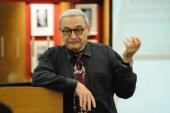
Prof. Hevia has retired and no longer directs BA theses or accepts new graduate students.
University of Chicago, PhD '86
BIOGRAPHY
James Hevia's research has focused on empire and imperialism in eastern and central Asia. Primarily dealing with the British Empire in India and southeast Asia and the Qing empire in China, the specific concerns have been with the causes and justifications for conflict; how empire in Asia became normalized within Europe through markets, exhibitions, and various forms of public media; and how the events of the nineteenth century are remembered in contemporary China. Both Cherishing Men from Afar (1995) and English Lessons (2003) focus on these issues. Subsequent research has centered on how the British in India developed and became dependent upon the production of useful knowledge about populations, geography, and pack animals to maintain their Asian empire. The first part of this project deals with military intelligence and appears in The Imperial Security State (2012). The second part of the project addresses military logistics, the uses of pack animals in warfare, the emergence of tropical veterinary medicine, and the physical transformation of the Punjab as a resource for supporting a security regime in northwest India. These subjects are taken up in Animal Labor & Colonial Warfare (2018). The third part of the project, now underway, considers the impact on India of new agricultural sciences that emerged at the end of the nineteenth century in Europe and the United States. Imperial Pests will focus attention on applied or economic botany and entomology and demonstrate how “constructive colonialism” in India situated imperial development projects in a global scientific network. It will specifically address the war on insect and weed “pests” and the long-term ecological impact on post-colonial nations-states in South Asia.
Recent Research / Recent Publications
Animal Labor & Colonial Warfare. Chicago: University of Chicago Press, 2018.
The Imperial Security State: British Colonial Knowledge and Empire-building in Asia. Cambridge: Cambridge University Press, 2012.
Yingguode Keye: Shijiu Shiji Zhongguo de Diguo Zhuyi Jiaocheng (English Lessons). Translated by Liu Tianlu. Beijing: Shehui kexue wenxian chubanshe, 2007.
English Lessons: The Pedagogy of Imperialism in Nineteenth-Century China. Durham, NC: Duke University Press and Hong Kong University Press, 2003.
Cherishing Men from Afar: Qing Guest Ritual and the Macartney Embassy of 1793. Durham, NC: Duke University Press, 1995. Chinese translation: Huairou yuanren. Beijing: Social Sciences Publishing House, 2002.
- Winner of the 1997 Joseph R. Levenson Book Prize, Association for Asian Studies.
"Tribute, Asymmetry, and Imperial Formations: Rethinking Relations of Power
in East Asia." In Past and Present in China's Foreign Policy, edited by John E. Wills. Portland, MN: Merwin Asia, 2011.
"Small Wars and Counterinsurgency." In Anthropology and Global Counterinsurgency, edited by John D. Kelly et al., 169–177. Chicago: University of Chicago Press, 2010.
"Tribute, Asymmetry, and Imperial Formations: Rethinking Relations of Power
in East Asia." Journal of American-East Asian Relations, special edition, From "Tribute System" to "Peaceful Rise": American Historians, Political Scientists, and Policy Analysts Discuss China's Foreign Relations 16, no. 1–2 (Spring–Summer 2009): 69–83.
"'The ultimate gesture of deference and debasement': Kowtowing in China." The Politics of Gesture: Historical Perspectives 203 (2009): 212–234.
"The Photography Complex: Exposing Boxer China, Making Civilization (1900–1901)." In Photographies East: The Camera and its Histories in East and Southeast Asia, edited by Rosalind Morris, 79–119. Durham, NC: Duke University Press, 2009.
"Plunder, Markets, and Museums: The Biographies of Chinese Imperial
Objects in Europe and North America." In What’s the Use of Art? Asian Visual and Material Culture in Context, edited by Morgan Pitlka, 29–141. Honolulu: University of Hawai’i Press, 2007.
"Rulership and Tibetan Buddhism in Eighteenth-Century China: Qing Emperors, Lamas and Audience Rituals." In Medieval and Early Modern Rituals: Formalized Behavior in the East and West, edited by Joelle Rollo-Koster, 279–302 Leiden: E.J. Brill, 2002.
"World Heritage, National Culture, and the Restoration of Chengde." Positions 9, no. 1 (2001): 219–244.
"Looting Beijing, 1860, 1900." In Tokens of Exchange, edited by Lydia Liu, 192–213. Durham NC: Duke University Press, 1999.
"The Archive State and the Fear of Pollution: From the Opium Wars to Fu-Manchu." Cultural Studies 12, no. 2 (1998): 234–264.
"Leaving a Brand on China." In Formations of Colonial Modernity in East Asia, edited by Tani E. Barlow, 113–140. Durham, NC: Duke University Press, 1997.
"Imperial Guest Ritual: A Translation and Introductory Comments." In Religions of China, edited by Donald Lopez, 471–487. Princeton, NJ: Princeton University Press, 1996.
"An Imperial Nomad and the Great Game: Thomas Francis Wade in China." Late Imperial China 16, no. 2 (1995): 1–22.
-
Named a 2015–16 National Humanities Center Fellow
-
Discusses "The Afterlives of Ruins: The Yuanmingyuan in China and the West" at the University of Chicago Center in Beijing [video, 66 minutes]
 THE UNIVERSITY OF CHICAGO
THE UNIVERSITY OF CHICAGO

